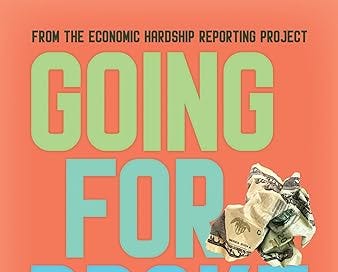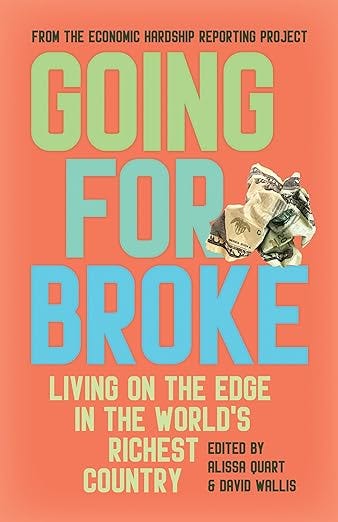Going for Broke
A conversation with Economic Hardship Reporting Project executive director Alissa Quart about the organization’s first essay anthology.
Readers,
This is the eleventh in a series of behind the scenes video interviews with authors, editors, teachers, and others in the field about aspects of writing and publishing personal essays, essay collections, memoirs, and other kinds of books.
Previously, I’ve interviewed Amy Shearn, Brian Gresko, and Sara Lippman about their Brooklyn-based teaching collective, Writing Co-Lab; Alex Alberto (they/them), K.G. Strayer (they/them), and Caroline Shannon (she/her) about their new anti-capitalist publishing collective, Quilted Press; author Elissa Bassist about writing the hard stuff through the lens of humor; Natalie Beach about moving past the viral essay that first brought her to everyone’s attendion, memoirist Pam Mandel about adapting her memoir for the screen; poet Maggie Smith about switching to memoir; author Abigail Thomas about her latest memoir with tiny Golden Notebook Press; Chloe Caldwell about acting as her own agent, Tajja Isen about the limited value of critical acclaim, and publicist Lauren Cerand about aspects of book publicity you can handle yourself.
These interviews are usually for paying subscribers only, but because this interview features an anthology published by nonprofit Economic Hardship Reporting Project, about which I’d like to help get the word out, I’m not pay-walling this episode.
In this episode, I talk with Economic Hardship Reporting Project executive director Alissa Quart about Going For Broke: Living on the Edge in the World’s Richest Country, the organization’s first anthology of essays it co-published in collaboration with a vast assortment of publications.
Quart and I talk about the organization she runs, her work and friendship with EHRP’s late founder, Barbara Ehrenreich, and of course about the book, which she co-edited with David Wallis.
It’s a hybrid collection, which includes personal essays, poems, photography, illustrations and cartoons. Divided into five sections—The Body, Home, Family, Work, and Class—the book contains more than fifty contributions. A diverse assortment of writers share their experiences with economic precarity, from being houseless and bankless, to becoming an essential worker during the pandemic when there were no journalism jobs, to selling one’s own blood plasma to survive, and beyond.
It’s a stellar lineup, incuding Camonghne Felix, Michelle Tea, Keeanga-Yamahtta Taylor, Astra Taylor, Elizabeth Catte, Alison Stine, and many others. Soon, an excerpt of Going for Broke, an essay by Alison Stine, will be reprinted in the First Person Singular series.





